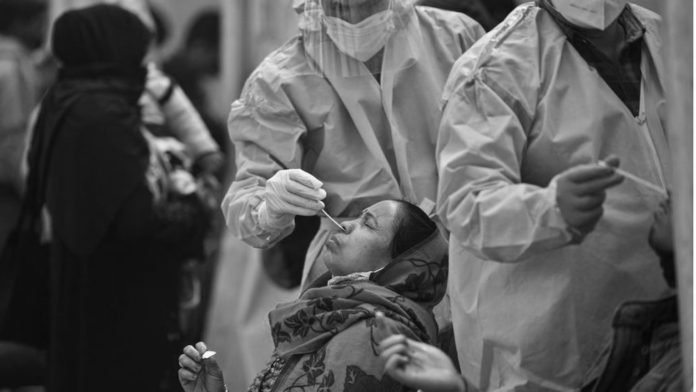India on Tuesday reported 1,61,386 new COVID-19 cases in the last 24 hours, bringing the total infection tally in the country to 4,16,30,885. The new Covid related cases were three per cent lower than yesterday’s 1.67 lakh daily spike.
The country also recorded a whopping 1,733 new deaths in 24 hours, as Kerala added a backlog of 1,063 fatalities to today’s count.
According to the Health Ministry, the Covid positivity rate dropped to 9.26 per cent from yesterday’s 11.6 per cent, while the weekly positivity rate was recorded at 14.15 per cent. India’s active caseload currently stands at 16.21 lakh cases.
In the ongoing Covid vaccination drive across the country, over 75 per cent of the country’s adult population is now fully vaccinated.
Tripura recorded 90 fresh COVID-19 cases on Wednesday, lower than the previous day’s count, while the death count rose to 910 with eight more fatalities, a health bulletin said. The state had registered 143 new infections and six deaths on Tuesday. Its coronavirus tally stood at 100,454.
Arunachal Pradesh reported more recoveries than new COVID-19 cases on Wednesday as 583 people were cured in the last 24 hours, a Health Department official said.
The state reported 246 new cases, taking the tally to 62,656, he said.
The total deaths rose to 288 after a Covid patient died on Tuesday. Arunachal Pradesh at present has 2,497 active cases.
Noting that timely completion of the Covid vaccination schedule is important to confer full protection of vaccines to the recipients, the Centre has asked the states and Union Territories to review the coverage of second dose amongst adolescents daily.
In a letter to the states and UTs, Union Health Secretary Rajesh Bhushan said a tailored communication strategy, focused at adolescent population and their caregivers, should also be rolled out to make them aware about the timely completion of vaccination schedule and sustain their vaccine confidence.
“I hereby request you to direct the concerned officials to accelerate the 2nd dose coverage amongst due beneficiaries aged 15-18 years while also ensuring that remaining beneficiaries for 1 dose also receive it in a time-bound manner,” Mr Bhushan said.
Pharmaceutical company Zydus on Wednesday announced that it has started the supplies of its COVID-19 vaccine ZyCoV-D to the Government of India against their order from its newly commissioned state-of-the-art Zydus Vaccine Technology Excellence Centre at the Zydus Biotech Park in Changodar, Ahmedabad.
The company is also planning to make the vaccine available in the private market.
The Ministry of Health and Family Welfare on Tuesday requested States and Union Territories to direct concerned officials to accelerate the second dose coverage amongst due beneficiaries aged 15-18 years while ensuring that remaining beneficiaries for the first dose also receive it in a time-bound manner.
The letter by Union Health Secretary Rajesh Bhushan to states and UTs highlighted that the nationwide COVID-19 vaccination programme of India has been expanded in a phased manner based on available scientific evidence and global best practices and presently, all persons aged 15 years and above are eligible for vaccination.
A subvariant of the highly contagious Omicron coronavirus strain, which some studies indicate could be even more infectious than the original version, has been detected in 57 countries, the WHO said Tuesday.
The fast-spreading and heavily mutated Omicron variant has rapidly become the dominant variant worldwide since it was first detected in southern Africa 10 weeks ago.
In its weekly epidemiological update, the World Health Organization said that the variant, which accounts for over 93 percent of all coronavirus specimens collected in the past month, counts several sub-lineages: BA.1, BA.1.1, BA.2 and BA.3. Several recent studies have hinted that BA.2 is more infectious than the original Omicron.
More about Omicron
The Omicron variant has been called a variant of concern by WHO based on studies that shows it has several mutations.
Still a lot of research is underway to evaluate its transmissibility, severity and reinfection risk.
The Omicron variant has been detected in several regions of the world. WHO reports that the likelihood of the Omicron variant spreading further globally is high.
It is not currently known if the Omicron variant is more or less severe than other strains of COVID-19, including Delta. Studies are ongoing and this information will be updated as it becomes available.
It is not yet clear whether Omicron can spread more easily from person to person compared to other variants, such as Delta.
However, being vaccinated and taking precautions such as avoiding crowded spaces, keeping your distance from others and wearing a mask are critical in helping to prevent the spread of COVID-19, and we know these actions have been effective against other variants.
Researchers are looking into any potential impact the Omicron variant has on the effectiveness of COVID-19 vaccines. Although information is still limited, WHO believes it is a reasonable assumption that the currently available vaccines offer some protection against severe disease and death.
It is also important to be vaccinated to protect against the other widely circulating variants, such as the Delta one. When it’s your turn, make sure to get vaccinated. If your vaccination involves two doses, it’s important to receive both in order to have the maximum protection.
According to WHO, early evidence suggests that people who have previously had COVID-19 could be reinfected more easily with Omicron, in comparison to other variants of concern. Information is still limited though and we will share updates as it becomes available.
Source: UNICEFRead more Health News
Latest update Omicron

